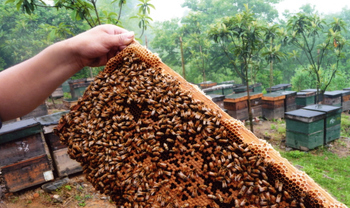Propolis
- Propolis is a resin-like material from the buds of poplar and cone-bearing trees. Propolis is rarely available in its pure form. It is usually obtained from beehives and contains bee products.
Contents
Uses
- Propolis has a long history of medicinal use, dating back to 350 B.C., the time of Aristotle. Greeks have used propolis for abscesses; Assyrians have used it for healing wounds and tumors; and Egyptians have used it for mummification. It still has many medicinal uses today, although its effectiveness has only been shown for a couple of them.
- Propolis is used for canker sores and infections caused by bacteria (including tuberculosis), by viruses (including flu, H1N1 “swine” flu, and the common cold), by fungus, and by single-celled organisms called protozoans. Propolis is also used for cancer of the nose and throat; for boosting the immune system; and for treating gastrointestinal (GI) problems including Helicobacter pylori infection in peptic ulcer disease. Propolis is also used as an antioxidant and anti-inflammatory agent.
- People sometimes apply propolis directly to the skin for wound cleansing, genital herpes and cold sores; as a mouth rinse for speeding healing following oral surgery; and for the treatment of minor burns.
- In manufacturing, propolis is used as an ingredient in cosmetics.
Benefits
- Propolis seems to have activity against bacteria, viruses, and fungi. It might also have anti-inflammatory effects and help skin heal.
Cautions
- Propolis is POSSIBLY SAFE when taken by mouth or applied to the skin appropriately. It can cause allergic reactions, particularly in people who are allergic to bees or bee products. Lozenges containing propolis can cause irritation and mouth ulcers.
- Pregnancy and breast-feeding: There is not enough reliable information about the safety of taking propolis if you are pregnant or breast-feeding. Stay on the safe side and avoid use.
- Asthma: Some experts believe certain chemicals in propolis may make asthma worse. Avoid using propolis if you have asthma.
- Bleeding conditions: A certain chemical in propolis might slow blood clotting. Taking propolis might increase the risk of bleeding in people with bleeding disorders.
- Allergies: Do not use propolis if you are allergic to bee by-products including honey, conifers, poplars, Peru balsam, and salicylates.
- Surgery: A certain chemical in propolis might slow blood clotting. Taking propolis might increase the risk of bleeding during and after surgery. Stop taking propolis 2 weeks before surgery.
Other Names
Acide de Cire d’Abeille, Baume de Propolis, Bee Glue, Bee Propolis, Beeswax Acid, Cire d’Abeille Synthétique, Cire de Propolis, Colle d’Abeille, Hive Dross, Pénicilline Russe, Propóleos, Propolis Balsam, Propolis Cera, Propolis d’Abeille, Propolis Resin, Propolis Wax, Résine de Propolis, Russian Penicillin, Synthetic Beeswax.
References
Source: WebMD, “Propolis”, www.webmd.com/vitamins-supplements/

